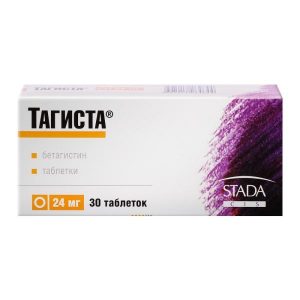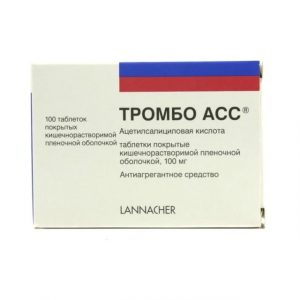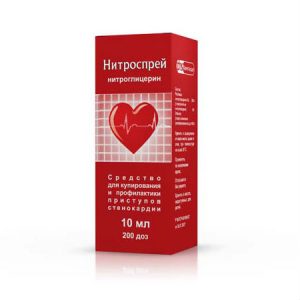Description
Release form
Tablets.
Packing
90 pcs.
Pharmacological action
Selective beta1-blocker without internal sympathomimetic activity and membrane-stabilizing properties. By blocking in low doses the 1-adrenergic receptors of the heart, bisoprolol reduces the formation of cAMP stimulated by catecholamines from ATP, and reduces the intracellular flow of calcium ions. It has a negative chrono-, dromo-, batmo- and inotropic effect, inhibits conduction and excitability, slows down AV-conduction, and reduces myocardial oxygen demand. Reduces heart rate at rest and during exercise. Reduces blood plasma renin activity. It has hypotensive, antiarrhythmic and antianginal effects.
With increasing doses, bisoprolol has a beta2-blocking effect.
At the beginning of the drug administration (in the first 24 hours), as a result of a reciprocal increase in the activity of -adrenoreceptors and the elimination of stimulation of 2-adrenoreceptors, OPSS slightly increases. After 1-3 days, OPSS returns to its original level, and with prolonged use it decreases.
The hypotensive effect of bisoprolol is due to a decrease in IOC, sympathetic stimulation of peripheral vessels, a decrease in the activity of the renin-angiotensin system (of great importance for patients with initial hypersecretion of renin), restoration of sensitivity in response to a decrease in blood pressure and effects on the central nervous system. With arterial hypertension, the effect occurs after 2-5 days, a stable effect – after 1-2 months.
The antianginal effect is due to a decrease in oxygen demand of the myocardium as a result of a decrease in heart rate and a decrease in contractility, lengthening of the diastole, improved myocardial perfusion. By increasing the final diastolic pressure in the left ventricle and increasing the stretching of the muscle fibers of the ventricles, it can increase the need for oxygen, especially in patients with chronic heart failure.
Antiarrhythmic effect is due to the elimination of arrhythmogenic factors (tachycardia, increased activity of the sympathetic nervous system, increased content of cAMP, arterial hypertension), as well as a decrease in the rate of spontaneous excitation of sinus and ectopic pacemakers and a slowdown in AV conduction (mainly in antegrade and, to a lesser extent, in retrograde directions via the AV node) and along additional paths.
Unlike non-selective beta-blockers, when prescribed in moderate therapeutic doses, bisoprolol has a less pronounced effect on organs, containing 2-adrenergic receptors (pancreas, skeletal muscle, smooth muscles of the peripheral arteries, bronchi and uterus) and for carbohydrate metabolism, does not cause sodium retention in the body. The severity of the atherogenic effect does not differ from the action of propranolol.
When used in large doses, it has a blocking effect on both subtypes of -adrenoreceptors.
Indications
– arterial hypertension
– IHD (prevention of angina attacks).
Contraindications
– shock (including cardiogenic)
– collapse
– pulmonary edema
– acute heart failure
– chronic heart failure at the stage of decompensation
– AV block II and III degree (without a pacemaker)
– sinoatrial blockade
crd – CARD – Srd Prinzmetal’s angina pectoris
– cardiomegaly (without signs of heart failure)
– arterial hypotension (systolic blood pressure
– bronchial asthma and COPD in the history of
– concomitant use of MAO inhibitors (except for MAO type B)
late stages of peripheral circulation disorders
– Raynaud
– pheochromocytoma (without the simultaneous use of alpha-blockers)
– metabolic acidosis
– child and adolescence to 18 years (effectiveness and safety of use not established)
– hypersensitivity to other beta-blockers
– hypersensitivity to the components of the drug.
Use during pregnancy and lactation
Use during pregnancy and lactation is possible if if the potential benefit to the mother exceeds the risk of side effects in the fetus and child (such as intrauterine growth retardation, hypoglycemia, bradycardia).
Composition
1 tab. contains bisoprolol fumarate 10 mg.
Excipients: microcrystalline cellulose – 20 mg, mannitol – 144.6 mg, croscarmellose sodium – 1.8 mg, magnesium stearate – 3.6 mg, hypromellose – 2.19 mg, titanium dioxide – 0.88 mg, macrogol 6000 – 0.53 mg.
Dosage and administration
Single dose is 2.5-5 mg. Typically, the initial dose is 5 mg 1 time / day. If necessary, increase the dose to 10 mg 1 time / day. The maximum daily dose for adults is 20 mg.
Tablets should be taken orally, in the morning, on an empty stomach, without chewing.
Treatment of patients with impaired mild or moderate hepatic or renal function usually does not require dose adjustment. In patients with severe renal impairment (CC
In elderly patients, dose adjustment is not required.
Side effects
From the nervous system: fatigue, weakness, dizziness, headache, drowsiness or insomnia, nightmare dreams, depression, anxiety, confusion or short-term memory loss, hallucinations, asthenia, myasthenia gravis, paresthesia in the extremities (in patients with intermittent lameness and Raynaud’s syndrome ), tremor.
From the sensory organs: impaired vision, decreased secretion of lacrimal fluid, dry and sore eyes, conjunctivitis.
From the cardiovascular system: sinus bradycardia, palpitations, impaired myocardial conduction, AV block (up to the development of complete transverse blockade and cardiac arrest), arrhythmias, weakened myocardial contractility, development (worsening) of chronic heart failure, decreased blood pressure, orthostatic hypotension , manifestation of angiospasm (increased impairment of peripheral circulation, cooling of the lower extremities, Raynaud’s syndrome), chest pain.
From the gastrointestinal tract: dry oral mucosa, nausea, vomiting, abdominal pain, constipation or diarrhea, impaired liver function (dark urine, yellowness of the sclera or skin, cholestasis), taste changes.
From the respiratory system: nasal congestion, difficulty breathing when prescribed in high doses (loss of selectivity) and / or in predisposed patients – laryngo- and bronchospasm.
From the endocrine system: hyperglycemia (in patients with non-insulin-dependent diabetes mellitus), hypoglycemia (in patients receiving insulin), hypothyroid state.
Allergic reactions: itching, rash, urticaria.
From the skin: increased sweating, flushing of the skin, exanthema, psoriasis-like skin reactions, exacerbation of psoriasis symptoms, alopecia.
Laboratory indicators: thrombocytopenia (unusual bleeding and hemorrhage), agranulocytosis, leukopenia, changes in enzyme activity, bilirubin and triglycerides.
Effect on the fetus: intrauterine growth retardation, hypoglycemia, bradycardia.
From the musculoskeletal system: muscle weakness, cramps in the calf muscles.
Other: back pain, arthralgia, rarely decreased libido – decreased potency, withdrawal syndrome (increased angina attacks, increased blood pressure).
Drug Interaction
In patients receiving bisoprolol, the allergens used for immunotherapy, or skin allergen extracts increase the risk of severe systemic allergic reactions or anaphylaxis.
Iodine-containing X-ray contrast agents for I / O administration increase the risk of anaphylactic reactions.
Phenytoin with / in administration and medicines for inhalation general anesthesia (hydrocarbon derivatives) increase the severity of cardio-depressive action and the likelihood of reducing blood pressure.
When used together, bisoprolol changes the effectiveness of insulin and oral hypoglycemic agents, masking the symptoms of developing hypoglycemia (tachycardia, increased blood pressure).
When co-administered with bisoprolol, it decreases the clearance of lidocaine and xanthines (except for dipillin) and increases their plasma concentrations, especially in patients with initially elevated clearance of theophylline under the influence of smoking.
The hypotensive effect of the drug when used together is weakened by NSAIDs (due to the delay of sodium ions and the blockade of the synthesis of prostaglandin by the kidneys), ACS and estrogens (due to the delay of sodium ions).
Cardiac glycosides, methyldopa, reserpine and guanfacin, slow calcium channel blockers (verapamil, diltiazem), amiodarone and other antiarrhythmic drugs when used together with bisoprolol increase the risk of developing or worsening bradycardia, AV block.
When used concomitantly, nifedipine can significantly reduce blood pressure.
Diuretics, clonidine, sympatholytics, hydralazine and other antihypertensive drugs, when used at the same time, can lead to an excessive decrease in blood pressure.
Cordinorm prolongs the action of non-depolarizing muscle relaxants and the anticoagulant effect of coumarins.
Tricyclic and tetracyclic antidepressants, antipsychotic drugs (neuroleptics), ethanol, sedatives and sleeping pills increase the depressant action of bisoprolol on the CNS.
Concomitant use with MAOI inhibitors is not recommended due to a significant increase in antihypertensive activity, with a break of at least 14 days between taking MAOIs and bisoprolol.
Non-hydrogenated ergot alkaloids when used together increase the risk of peripheral circulation disorders.
When used together, ergotamine increases the risk of peripheral circulation disorders.
Sulfasalazine increases plasma concentrations of bisoprolol.
When administered concurrently, rifampicin shortens T1 / 2 of bisoprolol.
Storage conditions
The drug should be stored out of the reach of children at a temperature not exceeding 30 ° C.
Expiration
2 years.
Deystvuyuschee substances
bisoprolol
Terms of pharmacy
Prescription
dosage form
dosage form
tablets
Catalent Germani Schorndorf GmbH, Germany




